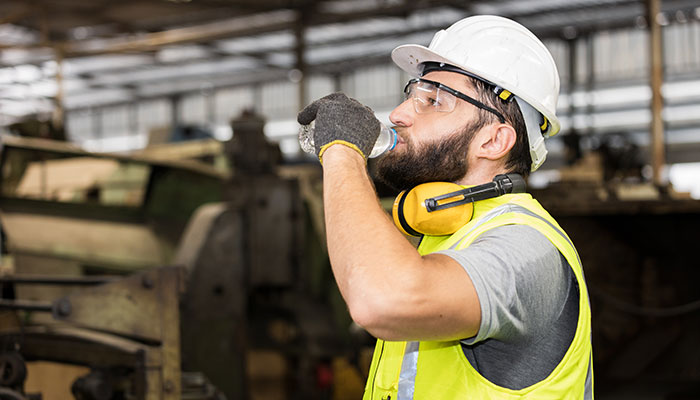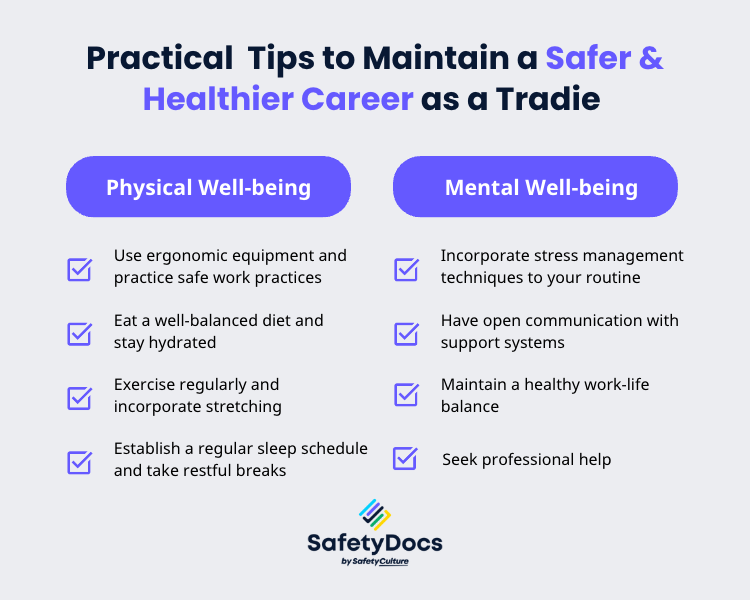Did You Know? August is Tradies National Health Month. Every August, Tradies National Health Month is observed across Australia as a dedicated national health campaign to spotlight the unique health risks and challenges encountered by workers in trade-based occupations, known as 'tradies'. Led by the Australian Physiotherapy Association (APA), this initiative promotes both physical and mental health through targeted education, industry engagement, and resources that support long-term wellbeing.
Tradies constitute only 35% of the workforce, and yet they account for a high number of serious workplace injuries and illnesses. In this guide, we'll explore practical tips and strategies to help tradies improve their physical and mental well-being, prevent injuries, and enjoy a long, fulfilling career, even beyond the Tradies National Health Month.
Who Are Tradies?
The term 'tradies' is an informal, colloquial abbreviation for tradespeople - professionals skilled in manual trades or trade occupations that require specialised training and expertise in Australia and New Zealand. The term encompasses a broad range of occupations within the construction, maintenance, and repair industries. Tradies working across various sectors, including but not limited to:
- Construction industry
- Electrical and Plumbing Services
- Automotive Repair
- Landscaping
- Carpentry
- Metalworking

Health and Safety Risks for Tradies
Tradie culture is known for its resilience and grit. But behind the hard work often lies a mindset that downplays pain, stress, or injury. This stoic mentality may contribute to delayed treatment, chronic conditions, and poor mental health outcomes.
Here are the most common risks faced to tradies' health:
Physical Health Challenges
Tradespeople work in tough jobs, often lifting heavy items, doing repetitive tasks, and working at high levels or heights. Those in carpentry, plumbing, and electrical trades are among the most affected, with the highest number of injuries. One-third of these claims result from injuries sustained during manual handling.
Consequently, tradies face a high risk of injury in their daily work, such as:
- Traumatic joint injuries and sprains
- Muscle strains and tears
- Lacerations, cuts, or punctures
- Burns and electric shocks
- Falls from heights
- Back pain, neck pain, and other musculoskeletal disorders (MSDs)
- Hearing loss
- Mesothelioma, a cancer caused by Asbestos
- Silicosis lung disease from breathing in silica dust.
Mental Health Struggles
The 'tough it out' culture prevalent among tradies significantly impacts their mental health. The consequences of this mindset can be severe, manifesting in high levels of stress, anxiety, and depression among tradies. Research shows that workers in the construction industry, a large subset of tradies, are six times more likely to commit suicide than to die from an industrial accident.
This culture also creates an environment where seeking professional help is often stigmatised. This reluctance to address mental health issues can lead to:
- Poor work performance
- Substance abuse
- Relationship problems
- Social isolation
Safer and Healthier Career as a Tradie
Here are practical tips to help you maintain a safer, healthier career in the trades:
Physical Well-being
A tradie's most crucial asset is their body, so taking care of it is essential. You can do this through:
1. Ergonomics and Safe Work Practices
Proper ergonomics and safe work practices can help prevent MSDs. When body positions require overexertion or awkward postures, use equipment such as trolleys and hoists to move heavy objects. Always remember to:
- Use ergonomic tools and equipment that reduce strain on the body, such as power tools with vibration control features.
- Take regular breaks to stretch and rest your muscles, as prolonged standing or sitting can lead to fatigue and discomfort.
- Be educated on the proper manual handling techniques and how to use them.
- Refer to Standard Operating Procedures (SOPs) or Safe Work Method Statements (SWMS) for guidance.
2. Nutrition and Hydration
Eating a well-balanced diet is essential to maintaining energy levels, preventing fatigue, and promoting muscle recovery. Keep these tips in mind:
- Balanced Diet Essentials
- Include proteins, such as lean meats, eggs, and beans, in your meals to support muscle growth and repair.
- Healthy fats for sustained energy.
- Complex carbohydrates for long-lasting energy release.
- Hydration Tips
- Drink more water.
- Avoid sugary drinks. They cause energy crashes.
- Eat hydrating foods with high water content.
- Avoid Energy Drains - Prevent energy slumps by avoiding:
- Processed foods
- Excessive caffeine
- Skipping meals

3. Exercise and Flexibility Training
Regular exercise and targeted flexibility training can help strengthen your body and prevent injuries. Here are a few exercises to incorporate into your routine:
- Planks, squats, and lunges
- Yoga or Pilates
- Stretching exercises targeting areas commonly affected by MSDs, such as the back, shoulders, neck, and wrists
4. Sleep and Recovery
Enough sleep is vital for your overall physical and mental well-being. Tradies often have physically demanding jobs that require restful sleep to recuperate effectively. To improve your sleep quality:
- Establish a regular sleep schedule.
- Avoid caffeine, alcohol, and heavy meals close to bedtime.
- Take restful breaks throughout the day.
Mental Well-being
The physical hazards of manual trades should not overshadow the importance of being mentally healthy. Here are some ways to maintain good mental well-being:
1. Stress Management Techniques
Here are some strategies to manage stress:
- Identify common stressors at work and develop strategies to address them.
- Incorporate relaxation techniques such as deep breathing or meditation in your routine.
- Take an hour or minutes to pause between tasks throughout the day..
2. Open Dialogue and Support Systems
Having open communication with your colleagues, employers, and loved ones is essential for mental well-being. It creates a supportive environment where you can share your thoughts and feelings without fear of judgment.
3. Work-Life Balance
Maintaining a healthy work-life balance can significantly impact your mental and physical health. Below are some ways to achieve this:
- Set boundaries and prioritise self-care.
- Take the time to relax and recharge, giving your body the chance to rejuvenate.
- Pursue hobbies or activities you love outside of your work commitments.
4. Seek Professional Help
Seeking professional help for mental health issues is not a sign of weakness. It takes courage to acknowledge and address these challenges. Remember that your mental health is just as important as your physical well-being.

Preventative Measures
Despite taking all precautions, accidents can still happen. Here are preventative measures to mitigate the risks:
1. Personal Protective Equipment (PPE)
Wear PPE appropriate for the job, such as:
- Safety glasses and earplugs for eye and ear protection.
- Hard hats, gloves, and safety boots protect against head injuries and hazards such as electrical shock and slips, trips, and falls.
2. Hazard Identification and Risk Assessment
Being aware of potential hazards and conducting risk assessments can prevent accidents. Here are some steps to follow:
- Identify hazards in your work environment
- Assess the severity and likelihood of these hazards
- Implement control measures to eliminate or mitigate risks
- Regularly review and update risk assessments
3. Safety Training
Proper safety training helps you understand risks and identify hazards. It also highlights the importance of following safety protocols and using PPE correctly. To conduct safety training:
- Identify and assess risks at the workplace.
- Develop a comprehensive safety plan and procedures.
- Train employees on safe work practices, including how to use PPE correctly.
4. Regular Site Inspections
Conducting regular site inspections can help identify potential hazards and address them promptly. You can use:
- Checklists to ensure all safety protocols are followed.
- Hazard reporting forms to record and address any hazards found.
- Inspection reports to document inspections and track progress on addressing hazards.
5. Injury Management
In case of an injury at work, it is crucial to have a clear and efficient plan for managing the situation. Here are some steps to follow:
- Immediately seek medical attention for injured workers.
- Report the incident and any near-misses to your supervisor or employer.
- Follow up with any necessary rehabilitation or treatment plans recommended by medical professionals.
6. Vaccinations and Immunisations
Ensure you are up to date with your vaccinations and immunisations. These protect you from potential hazards on the job, such as:
- Tetanus shots for puncture wounds
- Flu shots to prevent the spread of illnesses
- Hepatitis B vaccine for protection against bloodborne pathogens
Long-term Career Sustainability With SafetyDocs
Manual tradespeople must take charge of their physical and mental well-being to stay healthy and maintain long-term sustainability in their careers. You can never be too careful when it comes to safety, and that is where SafetyDocs by SafetyCulture can help.
With our comprehensive range of safety documents tailored to various industries tradies work in, you can ensure that your tasks and workplace are safe for you and your colleagues. SafetyDocs offers:
- Customisable safety templates to suit your specific needs
- Easy online access and sharing options
- Regular updates to ensure your safety documents are up to date with industry standards
Here are some essential documents for tradies to help mitigate risks and maintain safety at work:
We have also put together a Tradie Health & Safety Checklist – a FREE resource packed with practical tips and actionable steps to help tradies (and everyone else!) prioritise their well-being.
|
Pass this checklist along to the tradies in your life, or use it yourself to start a conversation about well-being with your friends, family, or colleagues. Let's all work together to create a healthier, happier community.
Remember, staying safe at work is not just for your physical well-being but also your long-term career sustainability. Contact us today to learn more about how SafetyDocs can help you!
Frequently Asked Questions (FAQ)
What is Tradies National Health Month?
Tradies National Health Month is an annual campaign held in August that raises awareness about the physical and mental health challenges faced by tradespeople. It promotes preventative health measures and encourages a culture of safety and well-being across the industry.
What are the biggest health risks tradies face?
Tradies face high risks of musculoskeletal injuries, falls, electric shocks, respiratory illnesses, and mental health conditions such as stress and depression. These are often made worse by the physically demanding nature of their jobs and the 'tough it out' culture.
Why is mental health a major issue for tradies?
Mental health is a critical issue because stigma often prevents tradies from seeking help. Long hours, job insecurity, and physical strain contribute to higher rates of anxiety, depression, and suicide, particularly in construction.
How can tradies stay healthy at work?
Tradies can stay healthy by using proper lifting techniques, eating nutritious meals, staying hydrated, wearing PPE, getting regular sleep, taking breaks, and maintaining open conversations about mental health.
What support does SafetyDocs offer?
SafetyDocs offers industry-specific templates for risk assessments, Safe Work Method Statements (SWMS), checklists, and training documentation to help tradies and employers create safer, compliant work environments.
Is the Tradie Health & Safety Checklist free to download?
Yes! The Tradie Health & Safety Checklist is available as a free resource designed to provide practical, everyday guidance for improving safety and health in trade industries.
Our team of experts is dedicated to providing accurate and informative content. Craig Cruickshank, our senior HSEQ advisor at SafetyDocs by SafetyCulture has reviewed this blog post to ensure the highest level of quality.
Learn more about Craig's work on LinkedIn for more industry insights.
Available for instant download and supplied in fully editable MS Word format for use in your business.
Please note that the above information is provided as a comment only and should not be relied on as professional, legal or financial advice.
Share This Article
